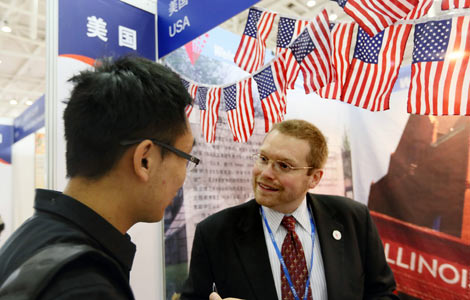Family planning policy to be improved
Updated: 2013-11-12 00:31
By Shan Juan (China Daily)
|
||||||||
China is to fine-tune its 30-year-old family planning policy, a spokesman for the nation's top population authority says.
But any step taken must serve to maintain a low birth rate while satisfying individual families' desire to have more children, the National Health and Family Planning Commission spokesman said.
China's social and economic development as well as demographic changes will also be considered in relation to any policy changes made, Mao Qun'an said at a regular news conference on Monday.
He added that fine-tuning the current policy has always been high on the commission's agenda.
Mao's comments follow widespread speculation that the central government will further relax the family planning policy after the Third Plenum of the Communist Party of China's 18th Central Committee, which opened in Beijing on Saturday.
There have been suggestions that couples where either the husband or the wife is a single child will be able to have a second child. At present, this only applies to couples who are both single children.
"We've conducted lots of investigations and research, focusing on population quantity, quality, structure and distribution to work out a guideline to fine-tune the family planning policy," Mao said.
"In the next step, the commission will implement the new policies set by the central government."
Mao added that any policy changes will be made in a prudent and well-coordinated way, taking into account the current and future situation.
He said China will continue to uphold the family planning policy as a basic national policy, given that its huge population places a heavy strain on economic and social development, resources and the environment in the long run.
Mao said a fine-tuning plan has been sent to the State Council and the question now is whether any change will be introduced nationwide or if trial runs will be held in selected areas.
Yuan Xin, a professor in population studies at Nankai University in Tianjin, ruled out any drastic policy change. "Issues surrounding how many children a family can have will, for a long time, still be decided by the government rather than the family itself," he said.
Supporters of change say an adjusted policy in pilot areas will help avoid a possible birth peak in the event of a blanket policy change.
But Yuan said: "Even a nationwide change won't have a major impact on population development.
"In central and western China, or in the countryside, the impact of a relaxed policy could be quite limited because of a relatively low proportion of single children."
There are more than 140 million single children across the mainland, mostly in large cities such as Beijing, Shanghai and Tianjin, the coastal provinces of Jiangsu and Zhejiang as well as northeastern areas, statistics from the commission show.
"So an eased policy will not compromise the nation's long-term goal of achieving low population growth," Yuan said.
Internationally, a fertility rate — the average number of children a woman has — of 2.1 is considered necessary to replace or renew the population. The rate in China stands at 1.6.
Experts say that with an eased policy the figure might rise to between 1.7 and 1.8, still a relatively low level for population growth.
Gu Baochang, a professor at the Population and Development Studies Center at Renmin University of China, said smaller families are a universal trend in socio-economic development.
A regional study conducted by his team between 2006 and 2010 found that 70 percent of rural families in Jiangsu province have single children.
As they entered childbearing age, of the 4,284 women surveyed who were eligible for a second child, under 10 percent chose to increase the size of their families.
Gu said, "Family planning policy is no longer the key factor determining people's reproduction choices."
Yuan said a policy change will help solve demographic problems such as an aging population and skewed gender ratio.
In 2012, the gender ratio at birth in China stood at 117.7 — 117.7 boys for every 100 girls — far higher than a global figure of between 105 and 107, according to the National Bureau of Statistics.

 Typhoon Haiyan claims 6 in S. China
Typhoon Haiyan claims 6 in S. China
 Iran to give UN inspectors more access to nuclear sites
Iran to give UN inspectors more access to nuclear sites
 In love with Yunnan
In love with Yunnan
 Online shopping gala sets records
Online shopping gala sets records
 Report shows jump in Chinese students going to the US
Report shows jump in Chinese students going to the US
 2 killed in Texas party shooting
2 killed in Texas party shooting
 Traditional retail battles websites
Traditional retail battles websites
 Singles Day becomes China's Black Friday
Singles Day becomes China's Black Friday
Most Viewed
Editor's Picks

|

|

|

|

|

|
Today's Top News
Sasser: An optimistic realist on US-China relations
ABC apologizes again for Kimmel 'joke' debacle
Global talent lacking in China
Journalists lead lonely-heart list
Iran to give UN inspectors more access
Reform expected to dominate talk at plenum
Real-estate bubble seen bursting
More Chinese students going to US
US Weekly

|

|






